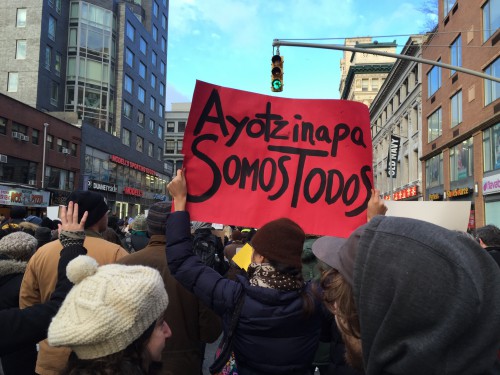Amid frustration because of the lack of response from the Mexican government, parents of the missing 43 students from the state of Guerrero are organizing a U.S. tour to raise awareness of the violence happening in their country.
A series of protests have sparked across Mexico since the disappearance. In the government’s search for the students, mass graves were found across the state containing incinerated bodies, but not belonging to the missing students, as reported by BBC.
The tour, known as “Caravan 43,” is planned to begin in March and visit at least 21 states, as explained by Julio Guerrero, the national organizer of the caravan.
“These students are the faces of the thousands who have been killed in Mexico,” Guerrero, of San Antonio, Texas, said during a telephone interview. “The whole world has been moved by this case. Many of us feel this will be the one that will stop disappearances and killings in Mexico.”
At least 15 people from Iguala have confirmed they will participate in the tour, according to Guerrero. The 15 includes parents of the missing students, and a student and professor from Ayotzinapa.

At Suffolk, junior Maria Paredes, a student from Guadalajara, Mexico, expressed disappointment in how this case was handled, although she said incidents like this one are not uncommon in Mexico.
“I discussed this with some old high school classmates,” Paredes said. “This might be the cherry on the cake of all the corruption and negativeness there is in our government and society.”
Guerrero reached out to the parents of the missing students in December. The parents, although skeptical at first to engage in any political action, agreed to travel, hoping that taking the case outside of Mexico will help them discover where their children are.
“The parents are not politically inclined,” Guerrero said. “They have become politicized because of the tragedy. They were just common workers.”
Of the challenges that have arisen while organizing this tour, the rural setting the parents live in has proved to be the most difficult. Minimal Internet access and bad cell phone coverage has impeded communication.
“I talked to them on Saturday, Jan. 17 just to see how things were going because people in the U.S. are anxiously waiting for them,” Guerrero said. “I called and had trouble getting through. Once I got ahold of them, they told me they were on the sierra with other citizens looking for the bodies of the kids. That’s why they had bad signal.”
Another obstacle that could put the tour at risk is the parents’ applications for visas to enter the U.S. The online applications, piled on top of the high costs, have slowed progress.
“Many of them don’t even have Mexican papers like a birth certificate or the documents many of us have because they have never needed them before,” Guerrero explained.
The group traveling from Mexico will be divided into three smaller groups to be sent off to cover the west coast, the central region, and the east coast of the U.S. They will reunite in New York and travel together to Washington D.C. They will also make a stop in Boston, but it is not yet clear how soon.
D.C. organizer Arturo Viscarra hopes to meet with members of Congress on this issue.
“These cases are specific to these parents,” Viscarra said by telephone, “but all Mexicans have been affected by this violence.”
Paredes, the Suffolk student, is critical of the way the disappearance has been handled by the Mexican government.
“[This has] disappointed me of how much the country has to go regarding being able to speak up and trying to change the country for the better,” she said.







